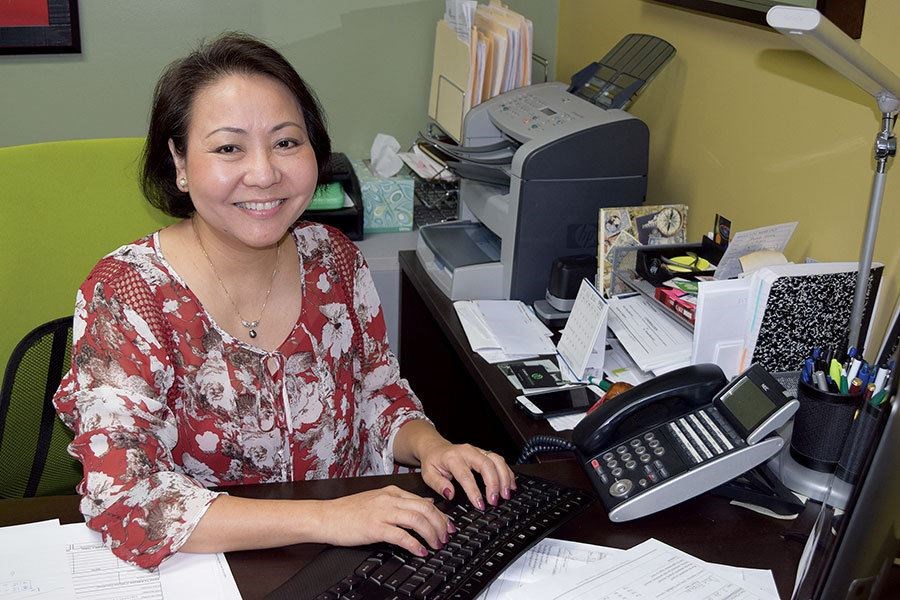Permission to use this
material was granted by
The Christian Science Monitor
Anh Nguyet Tranh, herself an immigrant from South Vietnam, founded a business in Michigan that employs some 250 interpreters and translators and can translate documents in 30 different languages.
 Ahh Nguyet Trann’s business provides translation for languages often considered difficult to support – from Albanian to Assyrian to Zaghawa and Zulu.Courtesy of Encore.org
Ahh Nguyet Trann’s business provides translation for languages often considered difficult to support – from Albanian to Assyrian to Zaghawa and Zulu.Courtesy of Encore.org
OCTOBER 7, 2017 — GRAND RAPIDS, MICHIGAN - It’s amazing to consider the fact that today, in western Michigan, people speak more than 120 languages. And it’s even more amazing for me to be part of helping many of those immigrant families integrate into our society.
I know where they are coming from.
My story begins aboard a boat with 100 others in the spring of 1975, my family and I reeling as our beloved homeland of South Vietnam fell into Communist hands. We lived for months as refugees before finally finding solace in Grand Rapids, Mich. (thanks to the welcoming arms of a Christian Reformed Church in the Alger Heights neighborhood).
Early on, I was intrigued by the idea of becoming a schoolteacher, but language issues prevented me from doing well on tests. Most of the teachers were very kind, but one, responding to a low score I had made, sneered at me, “You should have done better; you’ve been here a year already.”
Undaunted, I enrolled in English as a second language classes while continuing my formal education, and I graduated in 1980 from Grand Valley State University as a licensed practical nurse. I worked a short stint in a hospital psychiatric ward, but couldn’t handle the challenges of that. I married, moved back to Asia – to Japan – where I secured a job with the United Nations helping to resettle refugees and, later, worked as an interpreter and translator. I served as a liaison between the UN and the governments of Japan and Korea and Indochinese refugees, many of whom required resettlement all over the world.
Eventually, I found myself back in Grand Rapids. Realizing there was a growing need here for my skill set, I started a business in my basement – Liaison Linguistics – to help non-English-speakers. That became my encore career and, now, my lifework. (And I no longer work from my basement!) I employ some 250 interpreters and translators, some of whom are fluent in as many as seven languages. Turkish? Check. Dinka? Check. Mam? Check. Swahili? Double-check.
We are involved in virtually any arena where words are spoken or written – the court system, schools, medical facilities, workplaces, and factories. We primarily provide interpretation and written translation services, with on-site interpreting available in the Grand Rapids metro area and across Michigan. Our expertise in rare languages and dialects sets us apart; we can also translate documents in 30 different languages.
Mercy Health is a partnership of hospitals, physicians, and health-care providers in western Michigan. It has praised our “efficient professionalism and prompt response” to requests for interpretation – and appreciates our “strong involvement with the culturally perse Grand Rapids community.” We provide translation for languages often considered difficult to support – from Albanian and Assyrian to Zaghawa and Zulu. For good measure, we can field 16 languages spoken in Myanmar (Burma) and American Sign Language.
Especially satisfying is serving the nearby Kentwood Public Schools. Twice a year, we partner with mothers and fathers attending parent-teacher conferences. We deal with 450 such conferences in just two or three days.
Working as an interpreter offers three benefits: You are well compensated for your time and talent. You know you are helping another person as well as your community. And every time you are sent to work, you are learning something new.
Permission to use this
material was granted by
The Christian Science Monitor
Page created on 11/7/2017 7:54:05 AM
Last edited 2/21/2018 1:05:55 AM
